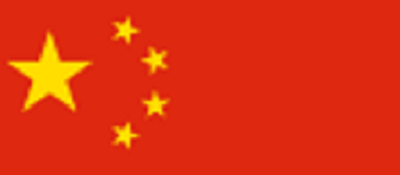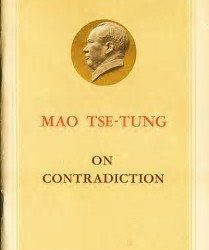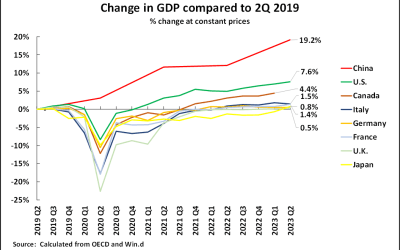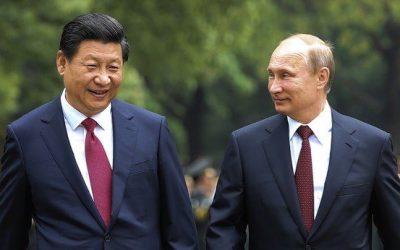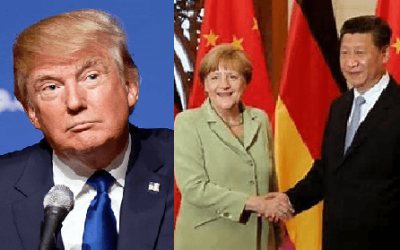This analysis of the the central necessity to defeat the US attack on Cuba for every progressive cause in the world, starting with Latin America, was originally published in Chinese at Guancha.cn.
The US in Latin America is at present once again seeing a series of countries attempting to follow independent policies, corresponding to their national interests, and some with a socialist orientation, rather than subordinating themselves to the US. These countries typically reject the current US cold war against China and indeed seek win-win relations with China. The US is responding to this trend by tightening its blockade of Cuba in an attempt to strangle that country in the hope of provoking a “colour counter-revolution”. This anti-Cuba US blockade is being carrying out in open defiance of an overwhelming majority of world opinion, as shown in the recent vote in the UN General Assembly of 184-2 against the US economic sanctions against Cuba.
If the US succeeds in this open defiance of world opinion on Cuba it will be emboldened to strengthen its attack on every other country it choses. The implications of this intensified US attempt to strangle Cuba go far beyond that country. As will be seen it affects the entire Latin American continent – and through that will have a significant effect on the world geopolitical situation. This article therefore examines this US offensive, the attempt to create a colour counter-revolution – and why Cuba is key to the situation in Latin America.
The new situation in Latin America
From the standpoint of US attempts to subordinate Latin America countries to its interests’ recent events in that continent are significantly disturbing.
- A pro-US coup d’etat in Bolivia in 2019, to remove President Evo Morales, was defeated when in October 2020 Luis Arce, candidate of the Movement Towards Socialism, won a crushing victory in the presidential election. Bolivia’s new government has declared it will return to cooperation with China, particularly in such strategic fields as lithium production, and former President Morales spoke at the recent Summit of the CPC and World Political Parties during the session at which Xi Jinping was the first speaker.
- Argentina is clearly seeking friendly relations with China – as shown by its president Alberto Fernández also speaking at the recent Summit of the CPC and World Political Parties, again in the session at which the opening speech was given by Xi Jinping.
- In the recent presidential election in Peru the candidate opposed by the US, Pedro Castillo, was elected – defeating the attempt by US backed forces to overturn the majority of the popular vote which was won by Castillo.
- Cuba’s president Miguel Díaz-Canel was another speaker in the session with Xi Jinping at the recent summit of the CPC and World Political Parties.
- Opinion polls in Brazil show former President Lula with a crushing 26% lead, 49% to 23%, against the present pro-US President Bolsonaro in voting intentions for the 2022 Presidential election. Both former President Lula and former President Rousseff have recently made clear they would end Brazil’s support for the US cold war against China and seek active re-engagement in BRICS.
In summary, public opinion in Latin America is shifting against the US, in favour of national independence, and the policy by a number of governments is also moving against the cold war with China. This has implications which go even beyond Latin America, to affect the geopolitical situation, through trade and investment, and due to the votes of these countries in the United Nations and other international bodies.
The sanctions against Cuba
Faced with this increased trend of Latin America countries pursuing more independent policies, and refusing to join the cold war against China, the US has recently responded in a number of ways which indicate its concern – such as sending the head of the CIA to Brazil to discuss with that country’s government with the obvious intention of trying to ensure that Lula does not win the forthcoming election. But a central part of the US attempt to ensure Latin American countries remain subordinated to it has been to intensify its sanctions against Cuba.
The Trump administration already tightened the sixty year-old US economic blockade of Cuba blockade by imposing 243 extra sanctions – all of which were retained in place by Biden. These intensified food, medical and fuel shortages in Cuba even before the Covid pandemic struck. Banks are increasingly refusing to transfer funds to Cuba for fear of US fines, and it is now almost impossible for Cubans living abroad to transfer money to their families on the island.
COVID-19 was a particularly serious blow to Cuba’s economy because one of Cuba’s chief sources of foreign currency was from international tourism – which was down 94 per cent in the first four months of 2021 due to the pandemic.
The US then responded to this situation by deliberately targeting cutting off medical supplies to Cuba – preventing delivery of COVID-19 medical requirements such as ventilators, personal protection supplies, and testing equipment. Despite having five home-grown vaccines, Cuba’s vaccination roll-out programme is hindered by a lack of syringes and raw materials as a direct result of the blockade.
As the well-known US magazine The Nation noted: “Imagine a country developing and producing its own Covid-19 vaccines, enough to cover its entire population, but being unable to inoculate everyone because of a syringe shortage. This absurd situation is real… Cuba has already vaccinated about 2 million of its 11 million people, and hopes to have 70 percent of the population vaccinated by August. Yet, because of the 60-year US embargo, which punishes civilians during a pandemic, the country is facing a shortage of millions of syringes.
“It makes little sense that a country so advanced in biotech and pharmaceuticals should have trouble sourcing syringes. This reality is a consequence of what amounts to US economic warfare, which makes it extremely difficult for Cuba to acquire medicine, equipment, and supplies from vendors or transportation companies that do business in or with the United States. Syringes are in short supply internationally, so no company wants to be bogged down navigating the complicated banking and licensing demands the US government places on transactions with Cuba…
“Cuba’s achievements in health are a model and a demonstrable benefit for the entire world—one that the United States should be supporting. This is a country that is developing its economy through health and education—a project that began 60 years ago with rural literacy and health campaigns. Cuba’s public health system has allowed it to outperform much of the world in terms of life expectancy, infant mortality and, most recently, per capita pandemic statistics.
“On the first day of the new administration, President Biden issued a national security directive calling for a review of the impact of sanctions on the response to the pandemic, with an eye toward offering relief. Hope for a sensible US policy toward Cuba was once again kindled. Now, almost half a year into the Biden administration, the Trump-era policies of “maximum pressure” remain in place. The White House has made it clear that improving Cuba-US relations—and with them, the daily lives of the Cuban people—is not a priority.”
Indeed, Cuba’s achievements in health are astonishing. Life expectancy in Cuba, a developing country, at 78.80 years is actually slightly higher than in the US. The US by attacking Cuba’s medical supplies, faced with a pandemic, is literally aiming to kill Cuban people. This illustrates clearly the falsity of the US claim to stand for “human rights”.
This present US policy is entirely deliberate and follows from the original US State Department memorandum on the blockade in 1960 which stated: “The only foreseeable means of alienating internal support is through disenchantment and disaffection based on economic dissatisfaction and hardship… every possible means should be undertaken promptly to weaken the economic life of Cuba… a line of action which, while as adroit and inconspicuous as possible, makes the greatest inroads in denying money and supplies to Cuba, to decrease monetary and real wages, to bring about hunger, desperation and overthrow of government.”
This is, of course, in line with the US formula for “colour revolutions” and “hybrid warfare” which has been carried out against numerous countries – and which is currently being employed against China in Hong Kong and in attempts to economically destabilise Xinjiang through sanctions.
“Hybrid war” and “colour revolutions”
Another side of this hybrid war, the attempt to create a colour revolution, is the spending by the US of hundreds of millions of dollars a year on so-called “democracy promotion” on Cuba, via organisations such as the National Endowment for Democracy – which funds groups and individuals who work undercover attempting to build US-supported opposition. Once again China is familiar with such methods from events in Hong Kong.
While the overwhelming majority of the Cuban people have not gone along with these attempts at hybrid war there are of course, as there were in Hong Kong, certain minority politically backward groups, and those who has simply been bought by the US, who have attempted to stage protests. Cuban President Miguel Díaz-Canel for example referred to: “In a very cowardly, subtle and opportunistic and perverse way, from the most complicated situations that we have had in provinces such as Matanzas and Ciego de Ávila, those who have always approved the blockade and who serve as mercenaries of the Yankee blockade on the streets, begin to appear with doctrines of humanitarian aid and a ‘humanitarian corridor.’ We all know where they come from.”
The US intensification of sanctions, together with the strain on the medical system created by COVID19, is leading to fuel shortages and power cuts, which in the height of summer means that air conditioning and fridges don’t work. The shortages create queues for medicines and basic goods which led to protests which were then exploited by pro-US elements. This, again, is the same pattern as in Hong Kong – where protests about legitimate issues, such as the high price of housing, were exploited by separatists who as usual falsely presented themselves under the banner of “democracy” and “human rights”.
Similarly, as also with Hong Kong, the US verbally declares its support for the “Cuban people” – as it does with the Chinese people. But in reality, by cutting off medical supplies and other goods the US is trying to impose hardship on the Cuban people. If those in the US administration proclaiming their support for “humanitarian aid” to Cuba were genuine in their intentions they would start with calling for the US blockade to be lifted to allow medical and other supplies to be sent to Cuba. However, of course the true objectives of the blockade are precisely to inflict suffering on the Cuban people.
But why is the US attempting to use so much pressure to try to damage Cuba? After all Cuba is a small country with a population of only 11 million – significantly smaller than the state of New York! To understand the reasons, it is necessary to consider the historical relation of the US and Latin America and the key role played by Cuba in this.
Latin America and the US
One of the very earliest and most fundamental steps in US policy to expand its international power came following the successful wars of national liberation by all Spain’s former colonies in Latin American, except for Cuba and Puerto Rico, during the first quarter of the 19th century. The US directly intervened into this process of the attempt of Latin America to achieve national independence by declaring the “Monroe Doctrine” in 1823. Formally this declared that any intervention in the politics of the Western hemisphere by foreign powers would be considered a potentially hostile act against the United States. But the factual content of this doctrine was that the US claimed Latin America as its “backyard” – in which it, as an emerging great power, would control the countries of Latin America. This began the long record of US invasions, US supported coup d’etats, US supported dictatorships, and other interventions in that continent. Latin American countries which the US has either directly invaded, or in which it supported coup d’etats or dictatorships, include Argentina, Bolivia, Brazil, Chile, Costa Rica, Cuba, the Dominican Republic, Haiti, El Salvador, Guatemala, Nicaragua, Panama, Paraguay, Peru, Uruguay, Venezuela.
There were, of course, attempts by the Latin American peoples to resist this long record of US dominance. These, in some cases, took the form of armed struggle – as by Augusto Sandino in Nicaragua in 1927-34, or the Communist Farabundo Martí in El Salvador in 1932. In other cases, there were nationalist bourgeois regimes – such as that of Getúlio Vargas in Brazil or Juan Peron in Argentina. But despite these periodic challenges to its supremacy the US always succeeded in regaining control of the situation.
Then during the Cold War with the USSR this control by the US of its Latin American “backyard” was formalised in the creation in April 1948 of the Organization of American States (OAS). The member states of the OAS pledged to fight communism on the American continent.
The Cuban revolution
The Cuban revolution of 1959, led by Fidel Castro, was therefore a stunning blow to the US. Not merely was socialism established in a state in the Western hemisphere, but the revolution proved popular and capable of fighting off all attempts by the US over six decades to overthrow it – most spectacularly in the defeat of the US backed attempted invasion of Cuba at the Bay of Pigs in 1961.
The Cuban leadership also proved itself highly skilful in a wide field of international relations. On the one hand Cuba acquired enormous prestige in Africa among progressive forces through its intervention to ensure the military defeat of international military aggression by the racist South African army in the late 1980s – Nelson Mandela referred to Fidel Castro as “a source of inspiration to all freedom-loving people.” But at the same time Cuba was able to maintain friendly relations with right wing governed countries such as Spain, Britain and Mexico. This skill in wide ranging diplomacy was seen again recently in the 184-2 vote in the United Nations against the US economic blockade of Cuba.
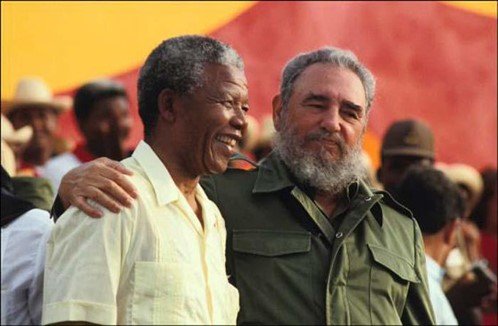
Fidel Castro and Nelson Mandela
But, of course, Cuba had particularly close relations with its own continent of Latin America. It is no exaggeration to say that virtually without exception every progressive leader in Latin America, whether simply seeking national independence or socialism, was an admirer of Fidel Castro. Within Latin America for progressive forces Fidel Castro had an prestige comparable to Mao Zedong in China. This extended beyond merely political figures to cultural and sporting icons – Gabriel García Márquez, widely considered the greatest Latin American literary figure of the 20th century, was a friend of Castro while the famous Argentinian footballer Diego Maradona had a tattoo of Fidel Castro on his leg!
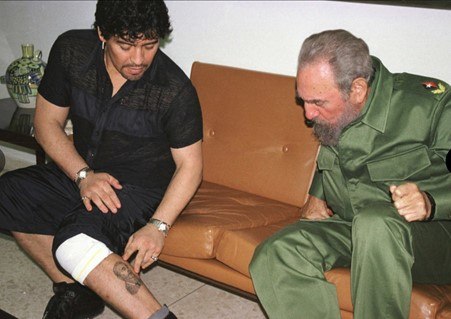
Fidel Castro and Diego Maradona
But, in addition to the immense authority gained by Fidel Castro through leadership of the Cuban revolution in 1959, he also took a step which none of the other leaders of progressive parties in Latin America did. After the 1959 revolution he created a real Marxist-Leninist Communist Party. It was the solidity of this organisation, and the leadership that it could give in numerous areas of society and politics, that explained the success of Cuba in resisting decades of US aggression and in developing the political line which brought Cuba such widespread international recognition.
Xi Jinping on Fidel Castro
These achievements of the Cuban revolution and Fidel Castro were fully understood by China and its leadership. Xi Jinping took the exceptional step of visiting the Cuban embassy in Beijing to formally express condolences on Fidel Castro’s death. It is simply necessary to note the full statement made by Xi Jinping on the death of Fidel Castro:
“Distressed to learn of the passing away of Cuban revolutionary leader Fidel Castro, I, in the name of the Communist Party of China, the Chinese government and people and in my own name, express my deepest condolences to you and through you to the Communist Party of Cuba, the Cuban government and people, and my sincerest sympathy to Fidel Castro’s family.
“Fidel Castro, founder of the Communist Party of Cuba and Cuba’s socialist cause, is a great leader of the Cuban people. He has devoted all his life to the Cuban people’s great cause of struggle for national liberation, safeguarding state sovereignty and building socialism.
“He has made immortal historic contributions to the Cuban people and to world socialist development. Comrade Fidel Castro is a great figure of our times and will be remembered by history and people.
“I met with Comrade Fidel Castro many times and held in-depth conversations with him. His real knowledge and deep insight inspired me as his voice and expression live in my memory. Both I and the Chinese people miss him deeply.
“Comrade Fidel Castro, who dedicated his life to the friendship between China and Cuba, paid close attention to and spoke highly of China’s development.
“As a result of his care and support, Cuba became the first Latin American country to establish diplomatic ties with China in 1960. Since then, the two countries have witnessed the profound development of bilateral ties, fruitful results of cooperation in a wide range of areas and deepening friendship between the two peoples, thanks to Comrade Fidel Castro’s solicitude and painstaking efforts.
“The death of Comrade Fidel Castro is a great loss to the Cuban and Latin American people. The Cuban and Latin American people lost an excellent son, and the Chinese people lost a close comrade and sincere friend. His glorious image and great achievements will go down in history.
“I believe that under the strong leadership of Comrade Raul Castro, the Communist Party of Cuba, the Cuban government and its people will carry on the unfinished lifework of Comrade Fidel Castro, turn sorrow into strength and keep making new achievements in the cause of socialist construction.
“The friendship between two parties, the two countries and the two peoples will definitely be consolidated and further developed.
“The great Comrade Fidel Castro will be remembered forever.”
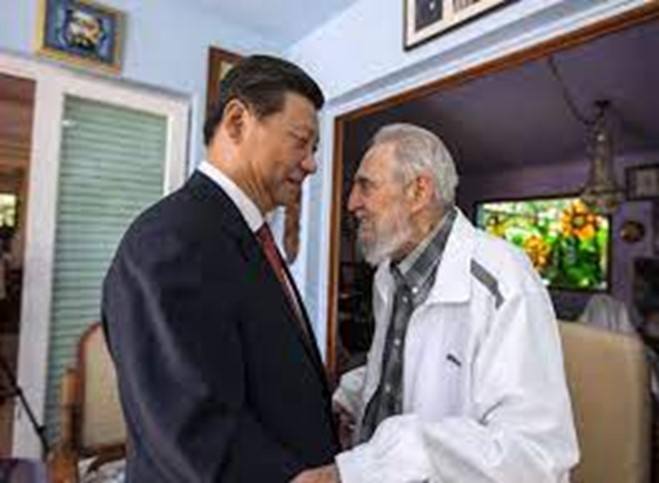
Xi Jinping and Fidel Castro
Fidel Castro on China
Fidel Castro in turn expressed his great admiration for China. This is what he said:
“If you want to talk about socialism, let us not forget what socialism achieved in China. At one time it was the land of hunger, poverty, disasters. Today there is none of that… China is a socialist country… And they insist that they have introduced all the necessary reforms in order to motivate national development and to continue seeking the objectives of socialism.”
“The Chinese process counted… with the contributions of great and brilliant political thinkers, who continued to develop and enrich the doctrines of socialism.
“China has objectively become the most promising hope and the best example for all Third World countries.”
Regarding Xi Jinping Fidel Castro stated: “Xi Jinping is one of the strongest and most capable revolutionary leaders I have met in my life.”

Fidel Castro salutes the statue of Mao Zedong
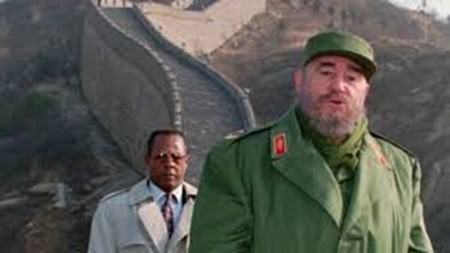
Fidel Castro at the Great Wall of China
Attack on Cuba
From these facts it can be easily seen why the US is concentrating its attacks on Cuba and why the outcome of these attacks affects not only just Cuba itself. Cuba has the strongest Communist Party in Latin America. Its leadership has state power. It is the centre of the network of forces fighting for national liberation and socialism in Latin America. If the US can succeed through its hybrid war in carrying out a colour revolution in Cuba it will break up the central element of progressive forces in Latin America. That in turn will have far wider geopolitical consequences.
If Latin America can be returned to full control of the US the movement of developing countries, the Global South, will be weakened and broken up. This will be used by the US to weaken the position of China – as, after China’s own development, the Global South is the strongest force opposing the US cold war against China. In addition to other aspects this will be seen every directly at the UN – Cuba, for example, took the lead on an international statement at the UN of countries supporting China on Xinjiang.
At the UN China regularly gains more votes than the US when the latter launches attacks on China – this was shown recently in votes on both Hong Kong and Xinjiang. If the US were to against reduce Latin America to its “backyard” this would be a major step towards its goal of regaining control of the UN.
The consequences of Cuba being central to the network of countries in Latin America supporting national independence and good relations with China can be seen not only in the overwhelming majority vote in the UN against the US embargo on Cuba but also in the statements by Latin American leaders against US actions against Cuba and calling for trade restrictions to be lifted. These countries strongly overlap with those countries in Latin America which have good relations with China – some of which were referred to at the beginning of this article.
Therefore allies of the US, such as the present right-wing government of Peru, Brazil, and Chile, immediately issued statements supporting protests in Cuba that were intended as an attempt to lead up to a colour revolution in Cuba – Brazil was also one of only three countries at the UN to abstain on the resolution against the US trade embargo against Cuba. Supporters of an independent path of development in Latin America, such as former president Evo Morales and President of Mexico Andres Manuel Lopez Obrador, on the contrary rightly pointed out that it was the US embargo which was preventing Cuba from getting the necessary medical and other supplies – and this was being carried out against the wishes of the overwhelming majority of countries.
Evo Morales, for example stated, on the situation in Cuba: “Our solidarity is with the brother Cuban people. The real fight for freedom in Cuba is to end the criminal blockade of more than 60 years. Its ‘sin’ was to create a vaccine with more than 92% effectiveness that affected capitalist interests. Cuba will defeat interventionism.”
In Brazil, the largest Latin American country, there was an open clash about the situation of Cuba between Bolsonaro, who supported the pro-colour revolution forces, and the Workers Party (PT). This exactly paralleled their international orientations – with the pro-US policies of Bolsonaro and stress on independence and good relations with China by the PT.
Thus Dilma Rousseff, the former president of Brazil, who had been a strong supporter of BRICS, and recently spoke a New Cold War conference in Brazil opposing a US cold war with China, declared: “60 years of economic and financial blockade of Cuba by the United States are subjecting the Cuban people to enormous sacrifices, which have become even more accentuated since the beginning of the Covid19 pandemic. The American blockade, which has already been condemned 29 times by the UN, imposes very serious deprivation on a small country that has been an example of solidarity, sending doctors around the world to help fight the health crisis. While Cuba offers humanity health professionals, it receives, in exchange, from the USA, in the midst of a pandemic, a cowardly embargo, which is repudiated by almost all countries in the world. I express my support to the Cuban people and to [Cuban] President Miguel Diaz-Canel.”
The Workers Party of Brazil issued a formal declaration: “The Workers’ Party (PT) expresses its unconditional support and solidarity to the people and government of the sister Republic of Cuba, which for six decades have been victims of a blockade by the United States of America (USA), damaging trade and diplomatic relations the country with the rest of the world.
“On June 23, the PT expressed its opinion on the vote by the member countries of the United Nations (UN) regarding the blockade, which was condemned by an overwhelming majority with 184 votes, with only two votes in defense of the blockade (USA and Israel) and three abstentions (Brazil, Colombia and Ukraine). This UN position is the same since the issue was first voted on.
“The Cuban people are the main victims of this long and criminal blockade, being excluded from regular conditions for a dignified life, which could be achieved in a situation of normality.
“Combined with the onset of the COVID-19 pandemic in early 2020, the country had difficult access to food, sanitary material and financial resources at a time of extreme need. In addition, the pandemic led to the worsening of the domestic economic situation, as a result of a drastic drop in earnings from tourism, one of the main sources of income in the country.
“Against all these adversities, Cuba managed to develop a vaccine against SARS-CoV-2, using its own technology, being in an advanced stage of internal vaccination and have even been able to export doses to other countries.
“Based on the above, the PT condemns those who – like the US government – speak of ‘humanitarian aid’ while maintaining the blockade and approving financial resources for opposition groups.
“The PT reaffirms its unrestricted condemnation of the blockade and demands its immediate lifting for humanitarian reasons, respect for international law and the inalienable right of peoples for their sovereignty and self-determination.”
China has, of course, taken the same position on Cuba’s national independence as progressive forces in Latin America. China’s Embassy in Cuba repeated a Chinese foreign ministry spokesperson’s declaration: “”China firmly opposes interference of external forces in internal affairs of Cuba, firmly supports Cuban side versus the COVID-19 pandemic, in improving quality of life of the population & maintaining stability.” China’s spokesperson for the Ministry of Foreign Affairs Zhao Lijian declared: “China urges the United States to immediately and completely lift the economic, commercial and financial embargo against Cuba. This is the universal call of the international community.”
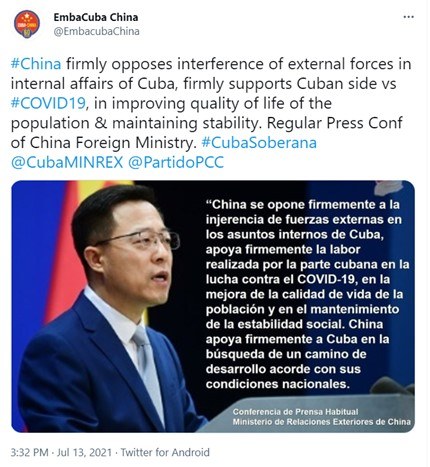
Tweet by the Chinese embassy in Havana condemning unilateral US sanctions against Cuba
The very large scale of the stakes in this struggle around Cuba, both for Latin America and internationally, are therefore clear. In words the US claims it stands for an international “rules-based order” but in fact the issue of the blockade of Cuba shows clearly the US is attempting to unilaterally impose its international policies against the overwhelming majority of the world’s countries. If the US is successful in its attack on Cuba, by use of a hybrid war, it will intensify such attacks in many other places.
The consequences if the US is successful in its hybrid war
It is therefore clear that the consequences of the present US attack on Cuba go far beyond that country. It the present US economic and medical attack on Cuba were successful in producing a “colour revolution”:
- It would remove the strongest and most prestigious force fighting for national independence in Latin America.
- It would greatly aid the US in breaking up the network of countries seeking to pursue a path of national independence in Latin America.
- By weakening the Global South, it would strengthen the US geopolitical position against China.
- It would convince the US that its unilateral actions can overrule the international community even when the US is in a tiny minority – thereby encouraging increasingly aggressive US actions.
- International experience confirms that when the US feels strong it is more aggressive and when it suffers setbacks it is more “peace loving”. Thus, for example, when the US felt weak because it was losing the war in Vietnam it launched détente, including with China, and restrained for a period from aggressive international military operations. And when the US felt weaker because it had suffered the international financial crisis it stressed international economic cooperation including with China. However, when the US felt it had recovered from its defeat in Vietnam, and was faced with the weak policies of Gorbachev, it launched a new military build-up and internationally aggressive policies, while when it felt stronger because it had recovered from the international financial crisis it launched trade aggression and the new cold war against China. Success by the US against Cuba, by strengthening the US would, therefore, be followed by new aggressive behaviour by the US.
Therefore, the outcome of the US hybrid war against Cuba would have profound negative implications in Latin America and internationally.
In conclusion
The present situation means the world faces a major geopolitical choice – which involves either a major win-win or a major lose-lose for numerous countries. The US faces a situation in Latin America of the rise of countries and movements which are pushing for nationally independent paths of development. To pursue this these countries break from US cold war policies against China and pursue win-win relations with China. For historical reasons in Latin America Cuba is at the centre of these developments. Therefore, the US is attempting to concentrate its strength against this small country – knowing that if it can defeat it, the US will impose a huge defeat on the movement for national independence and socialism in Latin America. The US, while proclaiming its support for “human rights” and a “rules based international order”, is in reality trying to impose the maximum suffering on Cuba in a unilateral way in total defiance of the overwhelming majority of international opinion.
The US in making this attack is gambling on the rest of the world giving in to its unilateral blackmail. Because while the downside consequences of a defeat of Cuba would be extremely large and negative for the cause of national independence, and for China, precisely because Cuba is a small country the assistance it requires to achieve decisive help in defeating this US aggression is very small in international terms. Some of Cuba’s needs, indeed, are ridiculously small – for example Cuba can produce its own COVID19 vaccines and simply needs syringes to administer them. Even voluntary help can be useful. For example, the US peace organisation Codepink has exploited opposition, even within the US, to attempts to prevent sending syringes to Cuba to gain the legal right to send them. It noted its aim was to: “raise $100,000 to send syringes to Cuba!… We are very excited that our friends at Global Health Partners have just received a Commerce Department license to send syringes to Cuba. Together with the Saving Lives Campaign, The People’s Forum and others, we are trying to quickly raise $100,000 to send about 3 million syringes. When we raise more than that, we will help Cuba with other health-related needs!”
Cuba only needs around 30 million syringes to vaccinate its entire population – that is a million dollars. This is a tiny sum for the countries, either together or even individually, which oppose the blockade of Cuba. The resources needed to deal with other difficulties in Cuba, such as ventilators, fuel supplies, food supplies, or even the size of its international debt, are tiny compared to the resources of countries that are against the blockade. The US aims to demonstrate that although it knows an overwhelming majority of countries in the world could meet the needs of such a small country as Cuba it intends to try to intimidate them into not doing so. If it does so successfully then it will be even more aggressive towards other countries.
For 62 years Cuba has given its support to the world in numerous ways. Prior to Covid19 and the tightening of US sanctions it had been rebuilding its economy – aided by international tourism and international medical services it could supply. But now it needs support from the world. But this is a win-win. Because it is a small country with a huge international impact the resources Cuba needs to most successfully aid it through the present problems created by the US blockade are tiny compared to the enormous benefits Cuba delivers to those countries opposing US aggression and cold war politics. Defeat of Cuba, that is success of the US in its hybrid war, would be a huge step forward for the US in its fight against national independence in Latin America and throughout the world, and in the fight against the new cold war against China.
It is for this reason that the situation in Cuba is today the key to the situation in Latin America and is of crucial importance throughout the world.
26 July 2021


